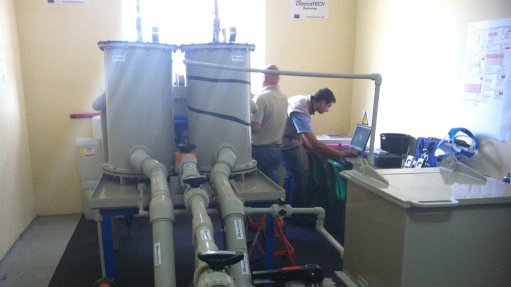
EFFICIENT The technology used in the Hydrox Electrolyser reduces the production costs of hydrogen
Gas solutions provider Hydrox Holdings has introduced a new hydrogen production method that reduces production costs by eliminating the need for membranes or expensive electrodes typically required to produce the gas.
Launched in December, the Hydrox Electrolyser is a simplified, robust and effective unit capable of achieving high-current densities using inexpensive nickel electrodes, explains Hydrox Holdings CEO Corrie de Jager.
“The electrolyser not only matches the performance of more expensive electrolysers, but also surpasses them as it does not suffer from the threshold limitations of membranes, which are costly and prone to breakdown and failure.”
De Jager adds that a small Hydrox Electrolyser can produce large volumes of hydrogen – making it the ideal unit for renewable-energy sources such as solar or wind.
Hydrox launched the new production method at the CARISMA 2014 conference, which took place in Cape Town from December 1 to 3. The conference invites international scientists to discuss the challenges inherent in developing fuel cell materials and membrane electrode assemblies for transport and stationary applications.
“The ability to separate hydrogen from oxygen in the production of usable hydrogen without a membrane is beneficial to companies,” says De Jager, adding that membranes are also brittle and unable to handle the extreme pressures and temperatures during production.
Tried and Tested
De Jager says Hydrox has been developing the technology used in the Hydrox Electrolyser for 15 years and that, over the past two years, engineering project management company DemcoTECH Engineering and scientists from North-West University have conducted extensive testing on the electrolyser, confirming the “enormous potential of this groundbreaking method”.
He adds that the Hydrox team is preparing a technical research paper, with full details of the new production method, for publication this year.
Projects in the Pipeline
De Jager tells Engineering News that Hydrox Holdings’ team of engineers aims to start several projects using the Hydrox Electrolyser, including a green energy house that will use solar energy to obtain hydrogen. He explains that the hydrogen will be stored in a tank, with electricity being provided for the house through a fuel cell, or possibly directly from a converted generator. The team expects to complete the house by the end of the year.
De Jager says the intention is to build a green energy house that will be “totally independent of Eskom and/or grid power”.
Other projects include using Hydrox technology in the desalination of seawater, the electrolysis of contaminated acid mine water and the conversion of dirty water into pure water. De Jager says the latter project will result in an increase of fuel cell sales, which will benefit the country, as fuel cells use a lot of platinum, which South Africa can supply.
Additionally, Hydrox is looking at other more affordable ways of producing electricity, as fuel cell technology is expensive and not well suited to the African environment, which requires a robust and cost-efficient solution. In the past, the Hydrox team has succesfully used the gas produced to run standard petrol and diesel generators and there are companies that are already doing inexpensive conversions of these generators to gas.
“The switch from liquefied petroleum gas to hydrogen is imminently achievable, with a substantial cost variation proving advantageous over fuel cells,” says De Jager, adding that one of the additional benefits of this is the elimination of carbon gases in the process.
“Hydrox Holdings’ technology will change the way producers make hydrogen in the future. It will unlock the hydrogen era, making it more accessible and affordable. “We have barely scratched the surface of the enormous potential this technology presents,” he concludes.